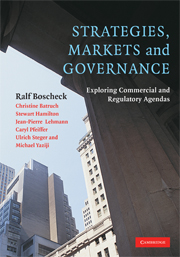Book contents
- Frontmatter
- Contents
- List of Figures, Boxes and Tables
- Acknowledgments
- Preface
- Notes on Contributors
- Part I Introduction and overview
- Part II Firm-level
- 2 Competitive advantage and the regulation of dominant firms
- 3 Delegating regulation: Supply-chain management, partnering and competition policy reforms
- 4 Diffusion of corporate governance regulation: France, Germany, the UK and the USA
- 5 Corporate governance after Enron et al.
- 6 Tackling healthcare fraud!?
- 7 Watchdog and proxy war campaigns against firms
- 8 Oil and conflict: Lundin Petroleum's experience in Sudan
- Part III Industry-level
- Part IV Country/International level
- Part V An observation in closing
- Index
5 - Corporate governance after Enron et al.
Published online by Cambridge University Press: 06 July 2010
- Frontmatter
- Contents
- List of Figures, Boxes and Tables
- Acknowledgments
- Preface
- Notes on Contributors
- Part I Introduction and overview
- Part II Firm-level
- 2 Competitive advantage and the regulation of dominant firms
- 3 Delegating regulation: Supply-chain management, partnering and competition policy reforms
- 4 Diffusion of corporate governance regulation: France, Germany, the UK and the USA
- 5 Corporate governance after Enron et al.
- 6 Tackling healthcare fraud!?
- 7 Watchdog and proxy war campaigns against firms
- 8 Oil and conflict: Lundin Petroleum's experience in Sudan
- Part III Industry-level
- Part IV Country/International level
- Part V An observation in closing
- Index
Summary
The millennium meltdown
When Enron, the seventh largest (by recorded revenues) corporation in the US, collapsed in December 2001, it caused a shock across the globe. But once the shockwaves had died away, the collapse was largely dismissed as an unfortunate aberration in the system, “the one bad apple.” Europeans, and others, looked on with a measure of Schadenfreude. This was to be short-lived. Then when WorldCom went down a few months later in the biggest corporate bankruptcy the world had ever seen, and reports emerged of other – if smaller-scale – disasters, from the UK, Switzerland, the Netherlands, Australia and elsewhere, it became clear that this was a global phenomenon.
As tales of trouble at ImClone, Adelphi, Tyco and Global Crossing, among others, continued apace in the US, these were paralleled elsewhere in the world. In the UK, TXU Europe collapsed, major problems at Marconi were revealed and, later, Equitable Life only just managed to come back from the brink; in Switzerland the failure of the national carrier, Swissair, rocked the country; in Holland, serious accounting fraud at Ahold was uncovered; and in Australia the scandal of HIH came to light. Perhaps most spectacular of all was the implosion of the Italian food giant, Parmalat, in Europe's biggest ever corporate failure, which removed any residual belief that these were solely American problems.
- Type
- Chapter
- Information
- Strategies, Markets and GovernanceExploring Commercial and Regulatory Agendas, pp. 88 - 103Publisher: Cambridge University PressPrint publication year: 2008



